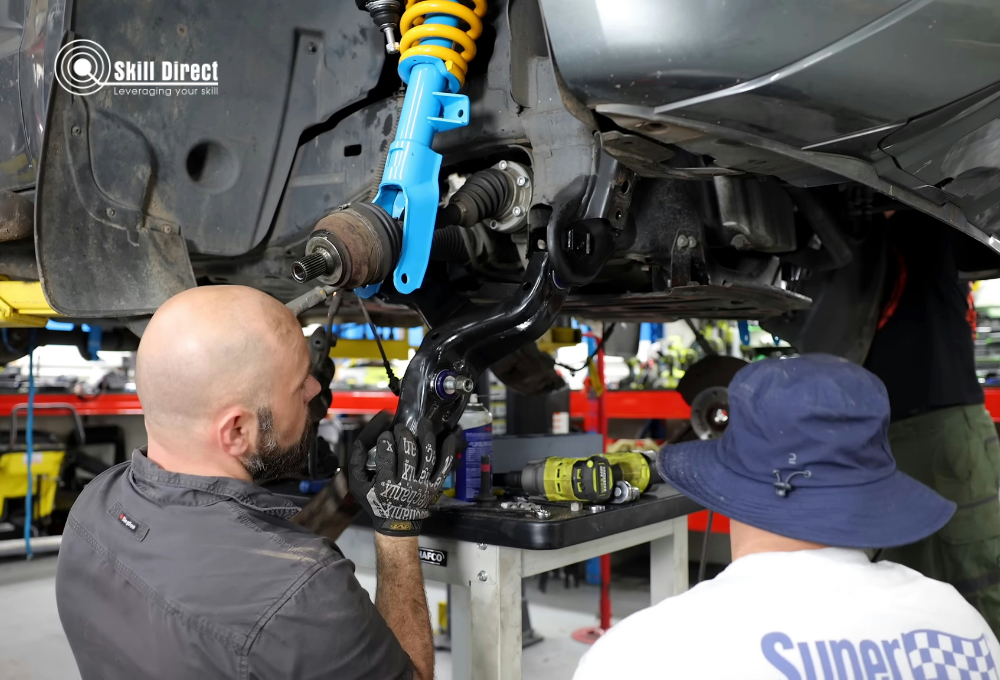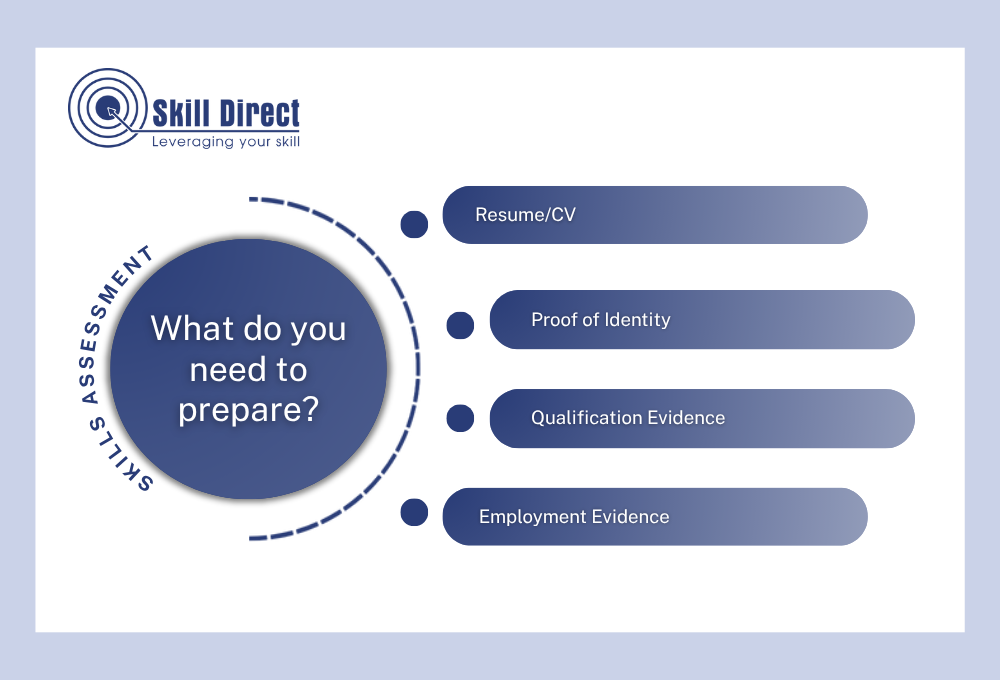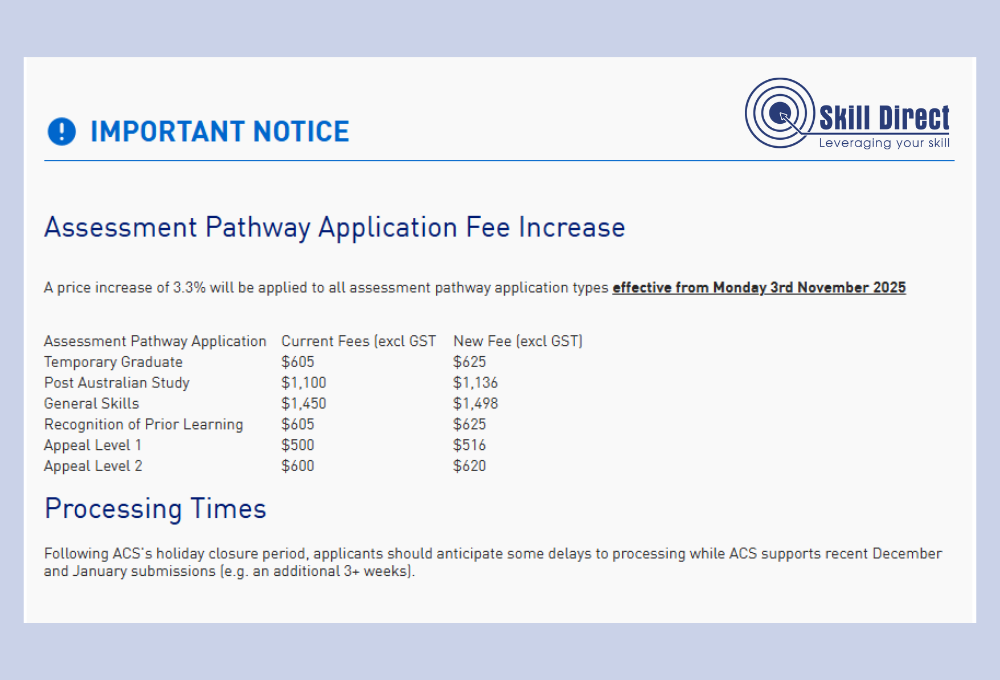Skills Assessment is an important step that verifies your qualifications and work experience before you submit your migration application. However, many people still wonder when the best time is to complete this assessment. Let’s explore with Skill Direct why it’s best to start your Skills Assessment as early as possible!
1. What is Skills Assessment?
Skills Assessment is the first and important step in your skilled migration journey to Australia. It is the process of evaluating your qualifications, skills, and work experience based on the professional standards set by the Australian Government. The main purpose of this assessment is to determine whether an applicant meets the skill requirements for their nominated occupation.
A positive Skills Assessment result is a mandatory condition before you can apply for a skilled migration visa. Below are some of the most common skilled visa types:
- Visa 189 – Skilled Independent (subclass 189): A permanent visa for skilled workers who are not sponsored by an employer, state, or territory.
- Visa 190 – Skilled Nominated (subclass 190): A permanent visa for skilled workers nominated by an Australian state or territory government.
- Visa 491 – Skilled Work Regional (Provisional) (subclass 491): A provisional visa for skilled workers nominated by a regional area or state.
From the Australian Government’s perspective, the Skills Assessment acts as a tool to evaluate and regulate the quality of skilled migrants, ensuring that selected applicants possess the right qualifications and expertise. This contributes to maintaining a high-quality workforce amid labor shortages and an ageing population.
From the applicant’s perspective, completing the Skills Assessment early offers numerous practical benefits. It helps you understand how your skills and qualifications are recognized in Australia, identify any missing documentation, and prepare additional evidence to increase your points.
This way, you can ensure that your application is complete, accurate, and compliant with assessment criteria-minimizing risks such as processing delays or visa refusals due to insufficient proof of competence.
In other words, the Skills Assessment is not only a mandatory requirement but also the first stepping stone on your journey to living and working in Australia.
2. When should you complete your Skills Assessment?
You already know that a Skills Assessment is an essential step in your skilled migration journey to Australia, but many applicants still wonder: “When should I start the assessment process, and who needs to do it?”

2.1 Who needs to complete Skills Assessment?
Anyone applying for a Skilled Migration Visa is required to obtain a valid Skills Assessment result before submitting their visa application regardless of whether you are in a professional or technical trade occupation.
2.2 What is the best time to apply for Skills Assessment?
The processing time for a Skills Assessment can vary depending on factors such as the complexity of your case, your occupation, and the assessing authority’s requirements.
Therefore, to ensure you receive your assessment result in time, the best moment to apply is as early as possible ideally as soon as you start planning your migration or intend to lodge a skilled visa application for Australia.
Completing your Skills Assessment early allows you to prepare thoroughly for the EOI (Expression of Interest) stage and gives you more time to obtain additional certificates, qualifications, or experience if needed before moving forward in the visa process. Moreover, having your Skills Assessment result ready in advance can increase your chances of receiving an invitation to apply (ITA) faster than other applicants.
It’s also important to note that if your visa application is refused, it becomes more difficult to reapply to the Department of Home Affairs, and your chances of approval in subsequent applications are significantly lower.
That’s why being proactive and completing your Skills Assessment early not only saves time and costs but also enhances your chances of success right from your first visa submission.
2.3 Where should you complete Skills Assessment?
In Australia, there are more than 40 assessing authorities authorized by the government to conduct Skills Assessments, with each authority responsible for specific occupations or professional groups. Choosing the right assessing authority is an important step, as each one has different criteria, procedures, fees, and processing times.
Below are some of the most common assessing authorities you can refer to when completing your Skills Assessment:
| Assessing Authority | Occupations Assessed | Website |
| VETASSESS | Covers most professional and trade occupations including technical, managerial, administrative, and service roles. | vetassess.com.au |
| ACS (Australian Computer Society Incorporated) | Specializes in ICT-related occupations such as IT Professionals, Software Engineers, and ICT Analysts. | acs.org.au |
| TRA (Trades Recognition Australia) | Assesses technical and trade occupations such as mechanics, electricians, chefs, and carpenters,… | tradesrecognitionaustralia.gov.au |
| CPAA (CPA Australia Ltd) | Responsible for assessing occupations in accounting, auditing, and finance. | cpaaustralia.com.au |
| IML (Institute of Managers and Leaders National) | Specializes in management, leadership, and business administration occupations. | https://managersandleaders.com.au/ |
Note: You must accurately identify your nominated occupation (ANZSCO code) to choose the correct assessing authority.
Submitting your application to the wrong authority may result in rejection or delays while correcting your submission.
Additionally, you should always check the official website of each assessing authority for the most up-to-date requirements regarding qualifications, work experience, application procedures, and processing times, as these can change with each Australian financial year.
2.4 Key documents required for Skills Assessment
To successfully complete your Skills Assessment, you need to prepare carefully a set of accurate and well-organized documents.
Below are the essential documents commonly required:
Resume / Curriculum Vitae (CV)
- Provide a clear overview of your education, work experience, professional skills, job titles, and key responsibilities in each role.
- Your CV should be concise, consistent, and aligned with the supporting evidence you submit.
Proof of Identity
- Include a recent passport-sized photograph, a copy of your passport, and/or national ID card.
Qualification Evidence
- Provide certified copies of your educational qualifications, academic transcripts, and training certificates relevant to your nominated occupation (ANZSCO code).
Employment Evidence
- Include supporting documents such as employment contracts, reference letters, pay slips, bank statements, or social insurance contribution records.
These documents help the assessing authority verify the authenticity and relevance of your work experience.

In addition to the documents listed above, you should always review the specific guidelines provided by your assessing authority to see if any additional documents are required.
Each authority may have its own rules and criteria for different occupations, so understanding these requirements in advance will help you prepare an exact application and avoid delays due to requests for further evidence during the assessment process.
3. Important notes for Skill Assessment
3.1 Keep updated of the latest requirements from assessing authority
Each assessing authority in Australia may update its requirements, fees, or procedures annually to align with new policies or economic conditions. For example:
-
VETASSESS recently announced an increase in application fees for both professional and general occupations, effective from October 22, 2025, due to inflation adjustments.
-
The Australian Computer Society (ACS) has also updated its assessment programs and fees for ICT-related occupations, including data and cybersecurity roles, for the 2025 financial year.

Therefore, even if your documents are already prepared, it is essential to check the official website again or contact the relevant assessing authority to ensure you have the most up-to-date information before submitting your application.
3.2 Contact professional support to increase your change of susscess
The requirements and policies for Skills Assessment are regularly updated each financial year, making it challenging for many applicants to prepare their applications correctly.
Even with careful preparation, a lack of understanding of the specific criteria for each assessing authority or missing work experience evidence can still lead to delays or negative outcomes.
In many cases, applicants also face difficulties in providing employment evidence, such as when a former employer has closed down, gone bankrupt, or lost HR records. These situations require a thoughtful and strategic approach that aligns with the assessing authority’s standards.
That’s why seeking support from Skills Assessment specialists at Skill Direct can help you save time, minimize risks, and significantly increase your chances of receiving a positive assessment result on your first attempt.
The Skill Direct consulting team will accompany you throughout the entire process from identifying your most suitable occupation, reviewing and verifying your evidence, and guiding you through document preparation, to helping you achieve a successful Skills Assessment outcome.
